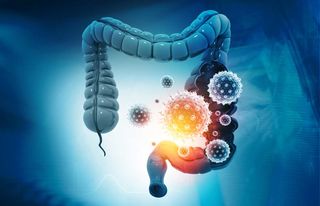Coronavirus Disease 2019
Can Gut Microbes Predict COVID-19 Severity?
A healthy gut microbiome might improve COVID-19 outcomes.
Posted May 1, 2020 Reviewed by Devon Frye
COVID-19 is notorious for striking harder at older patients, often landing them in bed, hooked up to a ventilator. Once that happens, the odds get grim: according to one report, only one in seven intubated patients survived. No one knows exactly why some patients are affected more than others, but a new study from China (that has not yet been peer-reviewed) makes a provocative assertion: the health of the gut microbiome may predict the severity of the disease. The healthier the gut, the better the outcome. That may be something to cheer about, because you can improve your microbiome in a matter of days just by changing your diet. It could save your life.

Scientists have started to realize that many of the chronic diseases of modern life are significantly associated with systemic inflammation and gut dysbiosis—a loose term that implies an unbalanced, unhealthy gut microbiome. Many of these inflammatory diseases, including diabetes, heart disease, and hypertension, are also associated with COVID-19 complications.
There is a psychological angle to this as well, due to the two-way nature of the gut-brain axis. The state of your microbiome can affect your disposition: the microbes that contribute to a good mood are called psychobiotics. But nature is nothing if not convoluted, and your mood can also affect your microbiome. The implication is that anxiety and depression may add to the complications of a COVID-19 infection.
There are many good reasons to be depressed by the coronavirus pandemic. The fear of infection can cause anxiety and sleeplessness. Sheltering in place can get lonely. If you get sick on top of it, your odds of anxiety and depression are boosted. These factors are out of your control, and that powerlessness exacerbates the problem. These factors multiply the risk of dysbiosis, providing a major challenge to the immune system.
How COVID-19 Affects the Gut
Although primarily a respiratory disease, COVID-19 affects the gut in half of symptomatic patients. That's due to the unique infection scheme of the virus. The coronavirus has a spiky surface made of proteins that act as keys to unlock cellular portals called receptors. The portals used by the coronavirus are called ACE2 receptors. These are found in many tissues throughout the body, especially lung tissue, which explains why the disease affects respiration. But they are also found in the small intestines and colon, making the gut an important part of the COVID-19 story.
How the Gut Affects COVID-19
In the Chinese study, the researchers examined the blood of COVID-19 patients and were able to isolate 20 proteins associated with disease severity. These proteins include immune factors that are elevated during systemic inflammation. They used these to create a proteomic risk score (PRS) that could predict the severity of the disease. Using machine learning algorithms, they were able to correlate the PRS to the gut microbiome as analyzed by fecal samples, thus linking the gut microbiome to COVID-19 severity.
With COVID-19 patients, a 10 percent increase in the PRS was associated with a 57 percent higher risk of progression to a clinically severe phase of infection. They discovered that the PRS was correlated to two important inflammatory markers, hsCRP and TNF-α. This correlation was stronger in people over 58. The power of PRS to predict COVID-19 severity was better than with other typical markers, including BMI, blood pressure, sex, and age.
The next step in their analysis, again using machine learning, identified specific bacterial players, both bad and good. For example, Ruminococcus gnavus was positively correlated with inflammation, while Clostridia was negatively correlated. Again, they found a strong association between these bacteria, the PRS, and COVID-19 severity—but only in older age groups.
For another part of this multifaceted study, they looked at a subgroup of 301 non-infected people over a three-year period. Intriguingly, they found that microbiome alterations occurred before the change was reflected in the PRS, making it plausible that dysbiosis causes the protein alterations and not the other way around.
The study isn't perfect. Although the cohort they used to establish the PRS included 990 people, the COVID-19 patients only numbered 31. But if what these researchers have found is true, the gut microbiome could be a major contributor to the severity of coronavirus. An unbalanced microbiome may create an inflammatory environment that the coronavirus can exploit. The researchers speculate that these gut-related inflammatory proteins—called cytokines—are amplified by more cytokines when coronavirus hits. The combined inflammation may ignite a "cytokine storm"—a runaway immune reaction that can cause more damage than the virus itself.
Intriguingly, the study did not find a difference between men and women in this regard. Since men are disproportionately affected by the coronavirus, this is likely not the whole story. When there is a sex difference, the likely culprits are hormones, which this study didn't address, but which are known to affect disease resilience. Women have a more diverse and variable microbiome than men, which might provide another piece of the puzzle.
What Can People Do?
As we age, our gut microbiome tends to change to a more inflammatory state. If you are in your 50s or older, you can greatly improve your odds of an uneventful COVID-19 infection by switching to an anti-inflammatory diet. What do beneficial microbes want? In a word, fiber. One of the reasons we have become sitting ducks for a pandemic is that America has exported a largely fiber-free diet around the world. We are suffering from an overload of "processed food," a term that means the fiber has been stripped out.
Fiber is nothing magical. It is composed of long chains of sugars that are too complex for our own digestive juices to break down, so they make it all the way through to the colon intact. There, they feed the three pounds of microbes that constitute the gut microbiome. Those microbes are specialists in fermenting fiber, and in the process, they produce short-chain fatty acids like butyrate that nourish and heal the cells lining the gut.
Without fiber, a narrower range of microbes can set up shop. If a few microbial species start to dominate, that can spell trouble for the gut. If this problematic microbiome lasts for days or more, the gut can become "leaky," letting toxins and bacteria invade the body. If they make it into the blood vessels, the heart will happily pump them to every organ in the body. No matter how useful microbes are in the gut, they are always bad news in the blood. That's how a gut inflammation becomes systemic. With an already taxed immune system, a coronavirus attack may be the final straw.
Fiber is found in vegetables, fruits, grains, greens, and beans, among others. Include these foods in your diet to balance and diversify the microbes in your gut. Studies continually point to a Mediterranean diet as significantly anti-inflammatory. Following it could greatly improve your odds when fighting the coronavirus. And, as a bonus, it could improve your mood.
References
Gou, Wanglong, Yuanqing Fu, Liang Yue, Geng-dong Chen, Xue Cai, Menglei Shuai, Fengzhe Xu, et al. “Gut Microbiome May Underlie the Predisposition of Healthy Individuals to COVID-19.” MedRxiv, April 25, 2020, 2020.04.22.20076091.




